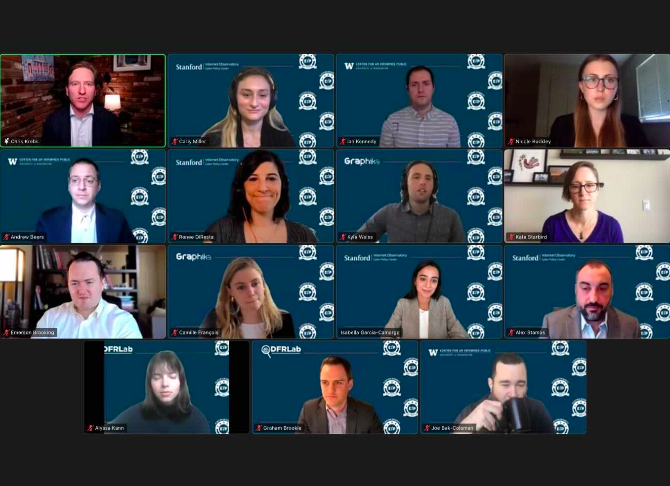Reflecting on the 2020 election, experts identified partisan news and social media as prominent culprits of spreading “fake news.” Analysts from the Election Integrity Partnership, along with former Cybersecurity and Infrastructure Security Agency director Chris Krebs, emphasized the Trump Administration’s role in spreading disinformation at a Wednesday event.
Krebs said that he led the CISA in aggressively discrediting social media conspiracies “before they hit mainstream news platforms” during the 2020 election season. However, he admitted that the CISA became overwhelmed, enabling many Twitter conspiracies to make their way to right wing news programs and former President Donald Trump. “It just wasn’t enough to eat away,” Krebs said. “And that was ultimately I think where we lost the advantage for rumor control.”
The analysts from EIP said that Trump and his allies played an active role in spreading these conspiracies. In reference to how long right wing partisans had spread disinformation, Emerson Brooking, senior fellow at the Digital Forensic Lab of the Atlantic Council — a D.C. research group focused on cybersecurity and disinformation — said that the now infamous slogan “Stop the Steal” was created by Roger Stone, one of Trump’s closest allies, in 2016.
University of Washington human centered design & engineering professor Kate Starbird ’97 stressed that Trump’s incessant election fraud claims during the summer and early fall of 2020 served as the point of origin for the spree of election disinformation post November. “President Trump in his campaign didn’t just prime his audience to be receptive to narratives of voter fraud, they inspired them to produce these narratives themselves, and then echoed those false claims back to them,” Starbird said.
Andrew Beers, a second-year human centered design & engineering Ph.D. student at UW, presented a graphical analysis that detailed the greatest spreaders of disinformation on social media, which included former President Trump, his two adult sons, Sean Hannity, James O’Keefe and other far-right “self-described news sources.”
However, the experts did not lay all the blame on Trump. Krebs acknowledged that “an expanding number of state and non-state actors” propagated lies and conspiracies to manipulate the charged political atmosphere.
According to Brooking, EIP’s research found that disinformation spread through both a “top-down” process — which saw right-wing influencers intentionally rile their base with provocative insinuations of a stolen election as we’’ — and a “bottom-up” process — in which individuals would share their perceptions on what they believed to be evidence of a stolen election, and their stories would garner enough attention on social media until it made its way to the preeminent right-wing influencers.
Starbird highlighted specific instances of the “bottom-up” and top-down” disinformation dynamic. Starbird pointed to Sharpie Gate: A panicked theory among Trump voters in Arizona that poll workers purposely handed them Sharpies to fill out ballots in order to make their votes illegible to the machine.
Krebs believes that both public and private entities must be involved in countering these disinformation issues. He proposed the creation of a “Counter Disinfo Czar,” a U.S. government position devoted to minimizing disinformation. Corporate executives are also key to this effort and must actively work to prevent perpetuating disinformation through their businesses, according to Krebs.
The CISA utilized this multidimensional approach, said Krebs, and worked closely with state and local partners in the private sector, academia and the federal government “to protect the 2020 election and defend democracy” under his direction.
It is crucial to implement a series of cybersecurity policy recommendations that are directed at maximizing the security of and public faith in democratic elections, said director of the Atlantic Council’s Digital Forensic Research Lab Graham Brookie. He further emphasized that there should be “overarching transparency information sharing” moving forward for American elections.
